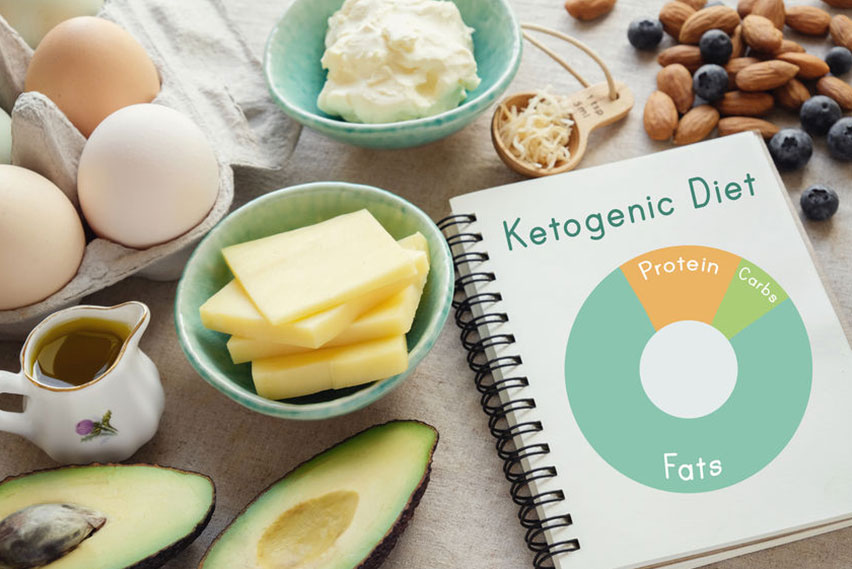Ketogenic Diet for Weight Loss
“Eating crappy food isn’t a reward — it’s a punishment.” – Drew Carey
The problem with a diet that relies mostly on carbohydrates is that creates an unhealthy dependence on sugar.
What most people don’t understand is that carbs eventually turn into a form of sugar called glucose once they’ve digested that plate of pasta.
And there are a bunch of adverse side effects that add up over time when you continually eat this way.
For one thing, your blood sugar will get too high, which will lead to more complications later on. Your pancreas will be hard at work pumping insulin into your bloodstream to remove that glucose.
But once there’s too much sugar in your system, all that glucose won’t have any place to go.
Usually, they’re stored in your muscles and liver. Once they’re full up, the only option is for your liver to turn that sugar into saturated fat.
A bloodstream chock-full of excess fats leads to other problems like insulin resistance, and eventually, diabetes.
How to Hack Your Metabolism
The solution would be to train your body to “prefer” other sources of energy aside from sugar. This way, you can put a stop to the metabolic pattern we just talked about.
Fat is a better fuel alternative. If you can find a way to end your dependence on carbs and sugar, your system will adapt. Then you can switch to a healthier, more sustainable energy source.
But how do you get your body to listen and shift gears?
Enter the ketogenic diet. Watch this free video on the truth about sugar
After making specific modifications to your eating habits, you’ll change the way you burn energy. Then you’ll turn yourself into an efficient fat-burning machine and lose weight naturally.
The secret is in your liver. Going back to what we discussed, this specific organ is forced to turn sugar into fat – this is a response to overconsuming processed foods.
However, you can “trick” your liver into breaking down those fatty acids floating in your system.
These will then be converted into what’s known as ketones – say hello to your new energy source.
That means you’ll now enter “ketosis mode” where your body automatically knows that it should utilize fatsinstead of carbs for fuel.
Fats are not Foes
Sometime around the 1960s, the U.S. government set nutritional guidelines based on studies that vilified ALLtypes of fat.
One such researcher that kickstarted this fat-phobic era was Ancel Keys. He was a nutritionist who established the idea that fats were the culprit of the heart attack epidemic at the time.
However, other researchers came to a different conclusion. These opposing views state that it was carbohydrates and sugar – not fats – that were behind weight gain and cardiovascular disease.
Sadly, these studies got buried under a mountain of biased (and some would say unethical) research that ignored this other piece of the puzzle. Instead, they focused only on fat, making it Public Enemy No. 1 for years to come.
Fortunately, we know better today.
Further studies that surfaced afterward showed that while there are genuinely harmful fats (like trans fats), there are other fats which are actually good for you.
In fact, fat isn’t just an excellent source of energy. It’s also a vital building block of brain matter as this organ is mostly made up of fat!
They also help you break down fat-soluble vitamins, as well as transfer nutrients between your cells. And they provide slow, steady bursts of energy for both brain-intensive and physical activity.
Ok, Great – But How Will Keto Help Me Lose Weight?
Keto practitioners swear by this lifestyle because it offers a slew of benefits.
For instance, they’ve kept their previously out-of-control cravings in check. Aside from that, they’ve now cleared away the brain fog that comes with a diet of highly processed food.
Their blood sugar levels stabilized as well. This also means their insulin production became nice and even. Watch the video on the scary truth about sugar. It’s part of a paid series but you can watch it here for free.
Better yet, keto eaters also report higher levels of energy with virtually no sluggishness or lethargy.
As for weight loss, studies show that this dietary approach is effective. Duke University Medical Center did a randomized, controlled trial of 120 overweight participants and tracked their progress.
Their study resulted in a couple of key findings:
- A low-carb, ketogenic diet was more effective at treating obesity than a low-fat diet
- The participants’ triglyceride levels went down, while their HDL cholesterol (a.k.a. the good kind) went up
As such, the keto way is great for reducing your carb intake. This helps tell your body to burn those pesky fats.
Recent Posts
- Looking at the Spatz3 and Allurion balloons – both have unique qualities and advantages.
- The issue of Obesity in New Zealand: An Inquiry into Medical Interventions and their Sustained Impacts.
- Gastric Sleeve Vs Gastric Balloon What’s the best option?
- Should I use medical intervention for Weight Loss?
- Sarah’s Gastric Balloon Journey
- Non-Invasive Gastric Balloons
- Why is it Hard to Lose Weight?
- Why Diets Do Not Work

